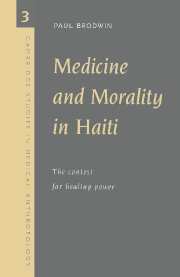Book contents
- Frontmatter
- Contents
- List of illustrations
- List of tables
- Acknowledgments
- Note on transliteration
- Glossary
- Introduction
- 1 The dialectics of healing power
- Part I History and ethnography of biomedicine
- 2 Metropolitan medicine and strategies of rule
- 3 Biomedicine in Jeanty
- 4 Medicalization and illness experience: two case-studies
- Part II The moral discourse of medical pluralism
- Notes
- Bibliography
- Index
3 - Biomedicine in Jeanty
Published online by Cambridge University Press: 15 December 2009
- Frontmatter
- Contents
- List of illustrations
- List of tables
- Acknowledgments
- Note on transliteration
- Glossary
- Introduction
- 1 The dialectics of healing power
- Part I History and ethnography of biomedicine
- 2 Metropolitan medicine and strategies of rule
- 3 Biomedicine in Jeanty
- 4 Medicalization and illness experience: two case-studies
- Part II The moral discourse of medical pluralism
- Notes
- Bibliography
- Index
Summary
The paradox of biomedicine
Although metropolitan medicine has always served as a tool of empire in Haiti (cf. Arnold 1988), it does not have this meaning for residents of Jeanty. For most people, attending a clinic and accepting a biomedical diagnosis are routinized parts of everyday life. Most villagers do not single out biomedical therapies as foreign or contrast them to a separate category of “indigenous healing.” People do not oppose biomedicine on moral or political grounds. Nor do they seek out biomedicine as a way to show that they are “modernizing” or to identify with the national elite in Haitian society. Villagers easily intermix biomedicine with other types of healing, without invoking the historical association of metropolitan medicine with foreign or neo-colonial domination.
This is the paradox of biomedicine in Jeanty. On the one hand, it is undeniably a metropolitan import, and it arrives with the full weight of foreign power and cultural cachet. On the other hand, it does not threaten to replace the work of midwives, herbalists, and religious healers with its own set of reductionist and culturally foreign interventions. Despite its origins, biomedicine does not exist as a bounded “health care sector” in isolation from other forms of therapy, and it has not subverted the local healing system. This chapter examines the roots of this paradox and its effects on the structure of medical pluralism in Jeanty.
The local history and ethnography of metropolitan medicine demonstrate one way (out of many) that this Caribbean micro-community is permeable to the intrusion of global forces (see Trouillot 1990b).
- Type
- Chapter
- Information
- Medicine and Morality in HaitiThe Contest for Healing Power, pp. 56 - 75Publisher: Cambridge University PressPrint publication year: 1996

